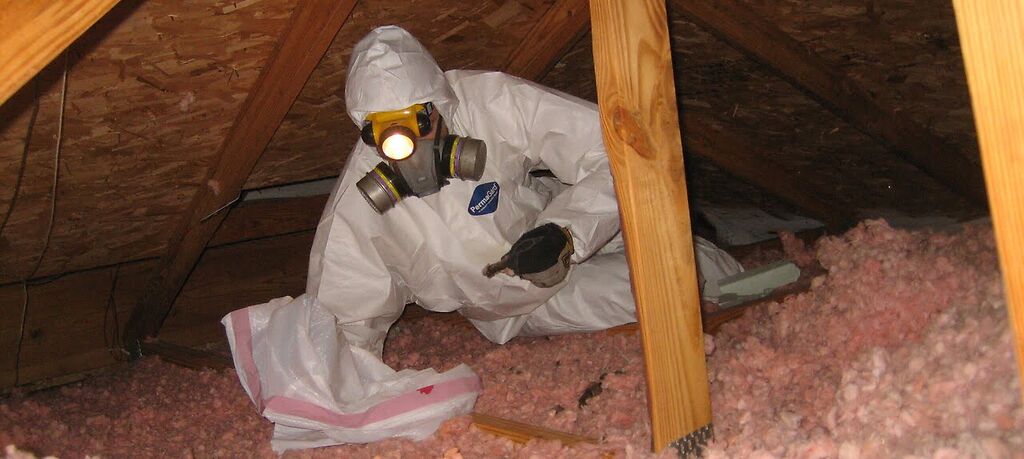What does raccoon feces look like?
Raccoon feces looks much like cat or dog poop in many cases, and for a while, you may even blame the neighborhood pets for that poop that keeps turning up on your back yard, especially if you don’t have a family pet yourself.
Around two to three inches long, and tube-shaped, you can often tell what kind of diet the animal has been enjoying, from the color, tone, ad even remnants left over in the animals waste matter. Berries, for example, are likely to remain in the poop and turn it a reddish-brown color, but if it has enjoyed a diet of corn, you will see corn leftovers (much in the same way you do with human waste matter).

Raccoon latrines
You’ll very often notice a ‘toilet’ of sorts being used by these creatures - a raccoon latrine, which is where they prefer to do all their business. They don’t like to sleep and eat in the same area in which they defecate, so having this separate section just for toilet-business, means it is a little easier for you to clean up. At least it is all together, rather than scattered across your lawn or up in our attic.
In the wild, the latrine will generally be something like within or under a tree stump or base, but these days, you’ll see them under garages, sheds, and porches, as well as up in your attic, or even in the crevices between the walls if it manages to get inside there.
Is raccoon feces dangerous to touch or breathe?
Sadly, the answer to this question is yes.
Commonly, the raccoon is more associated with the rabies virus, but this is a disease that cannot be passed on through waste matter such as this - this is a disease that is generally only passed on through saliva. This doesn’t mean the dead or decomposing body can’t still pass not he disease though, so you should be careful when handling this animal, dead or alive, as well as any fecal matter left behind.
Diseases from raccoon feces
There are quite a few disease that have been linked to raccoon feces, and these will include the following:
Leptospirosis
Many animals can transmit this disease, known to be a bacterial infection that in some cases, won’t even cause symptoms in humans, but in severe cases, could prove potentially life threatening. This is most definitely the case with people that already have under-active immune systems that can’t easily fight off the threat of diseases.
Aching muscles, jaundice, a high fever, and even a bad stomach can all be signs of leptospirosis, and although it is NOT found in the feces of the raccoon, it is found in the urine, which just so happens to be around the same place as the poop - in those latrines we told you about.
This means, until the entire latrine area is cleaned up properly with high-activity enzyme cleaners, it is a no-go area for the rest of the family - humans, children, pets or otherwise.
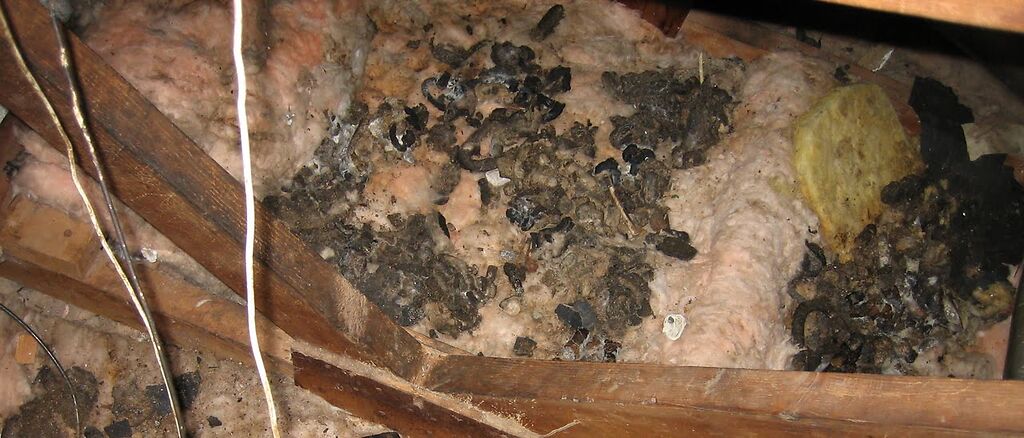
Raccoon Roundworm
Baylisascaris procyonis is the medical name, in case you wanted to know, and just like many other diseases, can often be found transmitted in the poop of a wild raccoon.
All it takes is to accidentally, and unknowingly, ingest the eggs of this roundworm, and you could become infected, putting you in danger as well as your kids, pets, and even other visiting animals and humans.
The symptoms of raccoon roundworm can vary massively from case to case but generally, liver complications, losing all muscle control, fatigue, and even blindness can be worst-case scenarios.
Obviously, just another raccoon poop disease you will want to avoid.
Giardia
A relatively unknown condition to many homeowners, this is another disease that can be spread via a whole range of animals, the rogue raccoon being just one of them.
The bad news is that this infection is easily transmitted from the raccoon’s waste matter - poop and urine, and it can contaminate anything it comes into contact with - soil, water, etc.
The feces and urine will contain infectious cysts that are accidentally ingested by humans and other animals, and this can cause a very nasty stomach upset which involves all the usual suspect symptoms - stomach cramps, diarrhea and vomiting, dehydration, and worse!
So yes, in short, raccoon feces is best avoided, especially if you don’t want to pass on one of these nasty and often complicated conditions to other animals or your family member. This is why all wild animal removal experts will always stress the importance of the cleanup operation after the animal has been trapped and successfully located - to ensure that your household is no longer at risk.
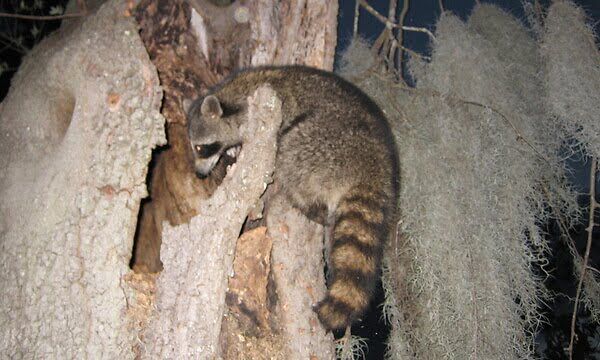
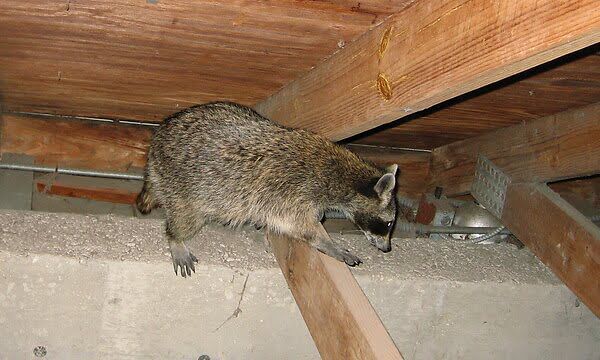
Where are raccoon latrines found?
Raccoons regularly develop ‘sites’ where they use the toilet - they hate to poop and pee where they sleep and eat, and are often found using raccoon latrines. Within this latrine, they will regularly go to the toilet, piling up new waste matter on top of old waste matter. As you can imagine, over time and if not treated, this can leave you with a very unpleasant smell, especially if it somewhere near your home, and during the spring and summer months; the months a raccoon is likely to enter your property, the waste material will get heated up by the hot weather, making the smell even more unbearable, as well as presenting a potential disease-risk.
As a general rule, raccoons prefer their latrines to be somewhere off the ground, and flat. Bases of trees make a great toilet for an animal like this, but similarly are roofs, decks, haylofts, attics that have not been sealed, large rocks, fallen logs, and woodpiles.
Is it important to clean raccoon feces out of my attic?
In short, yes! There is a massive disease risk posed by the leftover waste matter of this animal, and as well as things like raccoon roundworm, you’ll also find leptospirosis becoming a problem, and maybe even more dangerous conditions like that.
Left untreated and uncleaned, a raccoon latrine is going to become a breeding hole for all sorts of nasty bacteria, all of which can prove to be rather bad for your health, as well as the health of your family pets too.
In the defense of the raccoon, the chances of you getting roundworm from raccoon feces are rare, but it can and does happen. All it takes is to accidentally ingest one roundworm egg, and you will infected with the parasite, and handling the feces of this animal is enough to disturb the fecal matter and spread the disease far and wide. Before you know it, your unwashed hands will have taken that bug to the kitchen, the bathroom, and who knows elsewhere in your home?
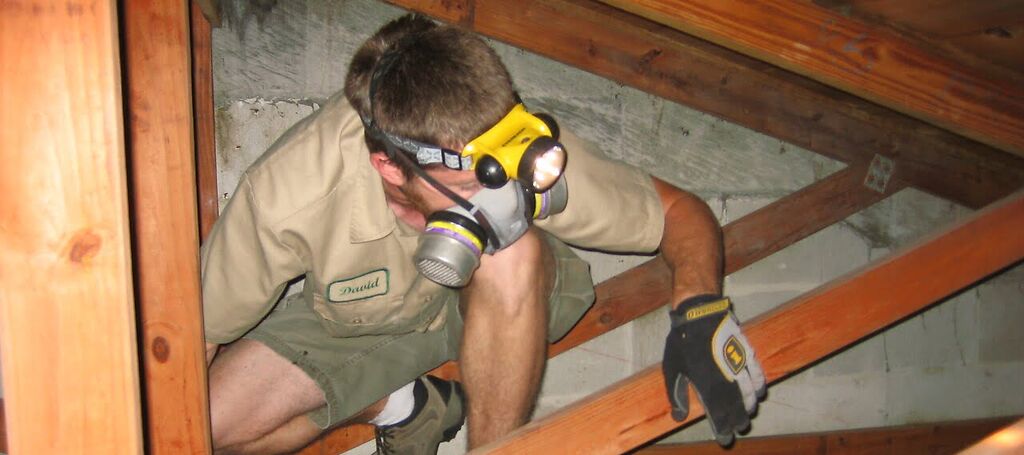
Cleaning raccoon feces
When you clean up the mess that the raccoon has left behind, you are going to want to do so protecting yourself as much as possible in the process. It is not unjustified to adorn a biohazard suit whilst you are completing the cleanup mission, and you should be using a seriously strong enzyme cleaner to break down the bad bacteria, the scent, and any reside left behind.
In fact, you’ll need a shopping list of things:
- Heavy duty, thick gloves.
- Disposable booties / boots made of rubber easily cleaned and disinfected.
- Face mask to prevent inhaling any bad bacteria or particles.
- Wear old clothes and burn them afterwards (if you are not going to wear a biohazard suit!)
- Heavy duty commercial vacuum cleaner, designed to pick up the poop.
If you have feces in the attic, you may find that you’ll need to get rid of the insulation material altogether. They may have used some of it for nesting or bedding material, and there’s definitely going to be some leftover waste matter in there somewhere. There’s nothing wrong with being over-careful in this situation, and everything wrong with not being careful enough. If you leave behind just the smallest trace of that raccoon, not only is it likely to come back (if you have trapped / released the creature), but it may even attract other animals, including rats, flies, opossums, etc. When you clean up, you need to ensure you REALLY clean up, getting rid of all traces the critter was ever there in the first place. This is why most people would prefer to use a professional wild animal removal company rather than trying to do it themselves - they know about the dangers of wild animal feces, and the importance of a thorough and proper cleanup operation.
A professional wild animal company will have all the necessary equipment to get rid of the raccoon feces, including the vacuum clatter specifically designed to be used just for clearing up a animal poop. You are not going to want to use your own household vacuum cleaner for this job, because you’ll run the risk of spreading that bad bacteria and potentially nasty bugs all around the house. You’ll use it to vacuum in the attic, and then when you do the bedrooms later, you’ll be spreading around anything that has been dislodged and become airborne, clinging to the cleaner as you move it around the home.
At the same time, not using a vacuum cleaner isn’t wise - it’s the only way to make sure you have all the feces and bad material picked up. This is why you should always use a professional!
